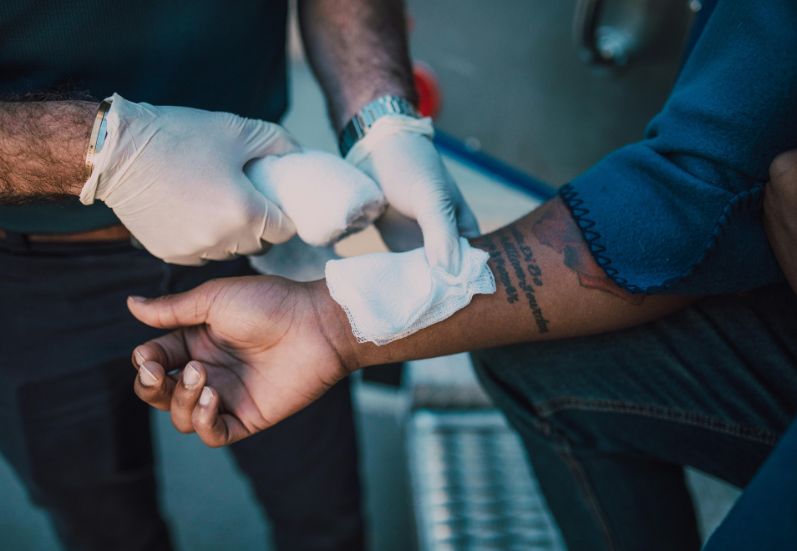
Today’s topic: Importance of personal injury evidence!
Yes, you read that right!
You see, we all know that gathering evidence often determines how solid a personal injury case you have that you are trying to prove.
Whether a car accident, a slip and fall, or another incident that was caused by someone else’s negligence was the source of your injury, gathering the right evidence is necessary for securing fair compensation.
Many people do not pay attention to the steps they have to take at the beginning and as a result, their case becomes weaker, and the legal process takes longer than it should.
Taking pictures of the scene and getting witnesses’ statements are among the ways you can get your claim built.
Hi. In today’s blog, I will explain how exactly these play a major role and how they influence the outcome of your case. So, if that is what you want to know, then you have come to the right place. Therefore, keep on reading this blog till the end and thank me later…
Why Is Evidence Important in Personal Injury Claims?

Evidence is the basis of any successful personal injury claim. It is the proof needed to show who the main facts in the case are.
The facts can range from who is responsible to the extent of the injuries suffered and how they affected your life.
Without proper evidence, even one that is morally right can still be rejected or challenged by insurance companies or in court.
Clear, properly documented evidence helps to demonstrate liability, showing how the defendant’s actions or inaction caused the accident. Evidence often includes the following:
- Photos of the accident scene
- Witness statements
- Police reports
- Surveillance footage
Medical records or expert opinions may also come in handy during personal injury claims to show the severity of your injuries. All of these can directly determine the compensation you receive from the claim.
Evidence also strengthens your credibility during the claims process. Insurance adjusters and opposing attorneys may exploit any inconsistencies in your case.
Thorough and consistent documentation helps to reinforce your version of events and reduce any chances of disputes.
The stronger your evidence, the more likely the opposing side will agree to a fair settlement. This could help you avoid a lengthy legal process.
Besides supporting your claim, evidence boosts your chances of recovering fair compensation for your losses.
7 Tips for Collecting Evidence for a Strong Personal Injury Claim
Obtaining solid proof in a personal injury case substantiates the plaintiff’s claim of negligence and establishes your rights to compensation.
By identifying and documenting instances of carelessness, your suffering, and your losses, you can reach a positive result. Here are seven recommendations for this.
Document the Scene Immediately
Capturing the scene right after an accident makes it possible to save the evidence while it is still fresh. The easiest way to do this is to capture clear pictures and videos of the scene, injuries, property damage, and any safety issues that may have been the cause of the accident.
Also, make sure to get close-ups and wide-angle shots from various angles. This visual evidence can support your version of the events that took place at the scene of the accident, especially if the place was cleaned up later.
Get Prompt Medical Attention and Obtain Records
Rapid medical intervention secures the well-being of a patient and simultaneously creates an essential file of his/her health condition.
Medical records are primary evidence indicating that the accident caused your health problem. The only condition is that you should not lie when describing your symptoms to doctors.
Do all that you are asked to do and keep copies of all the documents, medical invoices, and prescriptions.
These documents make it possible to prove from the financial point of view the seriousness of your injuries and their impact on your budget, thus giving more strength to your claim, even if your case goes to trial.
Collect Witness Statements
Your lawyer can use witness statements as very convincing evidence in a personal injury case.
If someone had seen the accident, get their contact details and a short note of what they observed.
Independent witnesses can give objective perspectives that can make it easier to prove the wrong party.
These statements should be gathered as soon as possible because they will be more accurate and detailed.
Witnesses are important, and their testimonies can be a great help to the strengthening of your case, not only during settlement negotiations but also in court.
Save Relevant Physical Evidence
Besides that, you also ought to save any relevant physical evidence that may help you substantiate your personal injury claim.
Such items include damaged clothes, broken personal belongings, and defective products; they picturize the symptoms of the incident and the cause for it.
Keep these items in the same state as they were immediately after the accident, and make sure you store them in a safe place.
Additionally, do not clean or fix them because any changes will decrease their value as your evidence.
Physical evidence is a kind of tangible proof that can be a help in your version of events and also in the establishing of liability.
File an Official Report
If you file an accident report, it clearly and formally delineates the happening, be it a police report, a workplace injury report, or an incident report at a business, the point is this documentation can be referred to in case one needs to establish the time, place, and How the injury occurred.
Additionally, it generally consists of details from the parties and witnesses who got involved, which can be evidence of your version of events.
Always get a copy of the report because it is an important part of your evidence that can help you make your case stronger.
Physical evidence is a kind of tangible proof that can be a help in your version of events and also in the establishing of liability.
File an Official Report
If you file an accident report, it clearly and formally delineates the happening, be it a police report, a workplace injury report, or an incident report at a business, the point is this documentation can be referred to in case one needs to establish the time, place, and How the injury occurred.
Additionally, it generally consists of details from the parties and witnesses who got involved, which can be evidence of your version of events.
Always get a copy of the report because it is an important part of your evidence that can help you make your case stronger.
Maintain a Personal Injury Journal
Maintaining a personal injury journal is a useful way to document the daily impact of your injuries.
And yes, it is best if you are able to record the following things:
- Physical limitations.
- Pain levels.
- Emotional struggles.
- Medical appointments.
Apart from these few things, you also need to document or record how exactly your injury affects your work or personal life.
These detailed, firsthand accounts provide insight into your suffering and recovery process, supporting claims for pain and suffering damages.
A consistent, dated journal can strengthen credibility and serve as compelling evidence.
What to Do After Collecting Evidence for a Strong Personal Injury Claim?
Once you have gathered substantial evidence to support your personal injury case, another crucial aspect is to systematically arrange and keep safe all the papers related to your case.
Store copies of the medical documents, official records, and your injury log in a safe and easily reachable location.
After that, reach out to a personal injury attorney such as Walkup, Melodia, Kelly and Schoenberger.
The attorneys experienced in your field who can inspect your proof, tell you if your case is strong, and lead you through the legal procedures will be of great help.
Do not discuss the matter on social media or with insurance adjusters without a lawyer. Your attorney can be a go-between with insurers and can make sure you get the highest possible compensation by negotiating.
To make a strong personal injury claim, you must collect solid evidence. This involves the following:
- Documenting the scene.
- Getting prompt medical attention.
- Collecting witness statements.
- Saving physical evidence.
- Getting the official report.
Additionally, it also involves getting expert testimonies and maintaining a personal injury journal.
Also Read:
- 8 Common Personal Injury Claim Mistakes
- 5 Things Accident Victims Should Know Before Going to a Personal Injury Trial











0 Reply
No comments yet.